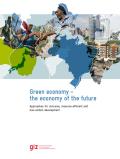
Green economy and green growth can best be pursued by using a multi-disciplinary approach, mobilising know-how and best practices from various fields. To this end, GIZ has established an Exchange Platform on Green Economy and Green Growth. It facilitates learning about the green economy, further develops services for our partners and commissioning parties and promotes good practices across our programmes.
The platform draws on the long-standing expertise of GIZ’s Sectoral Department, which offers services and concepts that contribute to the development of a green economy, in particular in the areas of:
- Economic development and employment
- Good governance and human rights
- Water, energy and transport
- Rural development and agriculture
- Environment and climate change
This paper explores the high dependency of a number of countries of the Southern African Development Community (SADC) on mineral resources, and the relative lack of expected social benefits from the extractive industries sector in these countries. The brief finds opportunities for greener and inclusive growth by linking extractive industries to other development goals beyond economic returns, as well as by integrating environmental concerns more broadly into economic development plans.
How can Africa’s vast natural resources create more wealth for the African people in a more resource-efficient and beneficial manner? What are the pathways to industrial growth which can create greater employment, produce higher outputs with lower inputs, and enhance competitiveness for African economies? How can vulnerabilities created by climate change, desertification and external shocks in the world economy be tempered, if not eliminated? What challenges will African countries face in the transition to a green economy and how could such challenges be overcome? What experiences within and outside Africa offer lessons that could be built upon?
These are questions that this report seeks to address. The report is meant to stimulate further discussion, aiming to contribute to articulating African views and perspectives on the theme of green economy in the context of sustainable development and poverty eradication for the United Nations Conference on Sustainable Development (Rio+20) in 2012.
